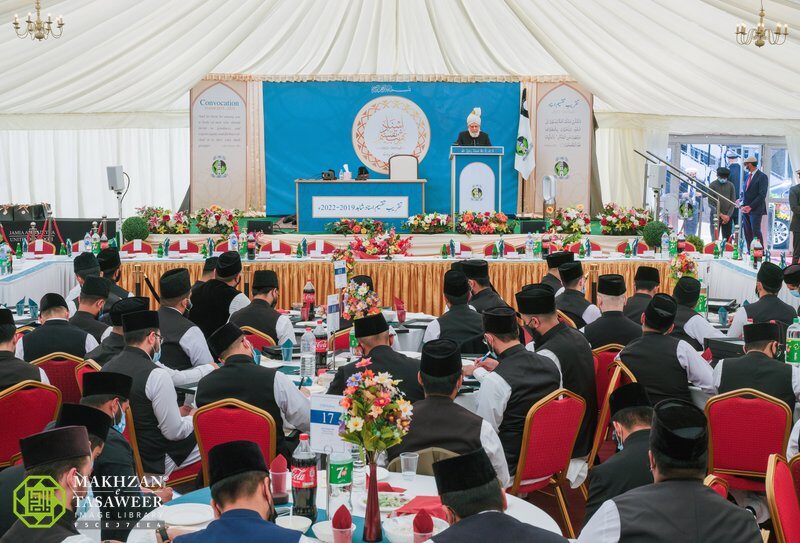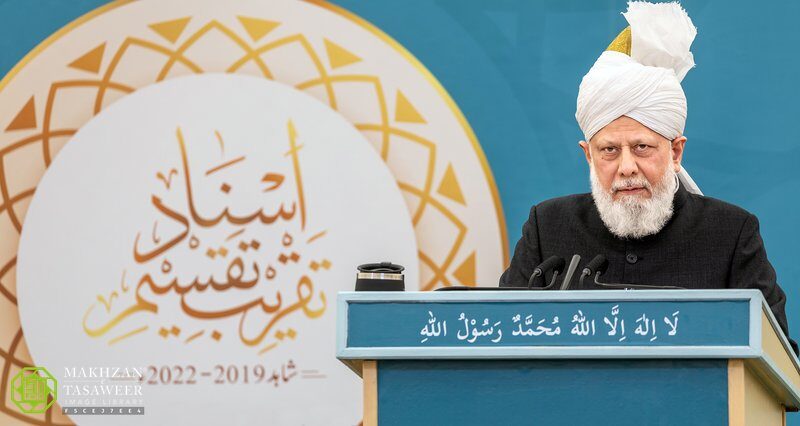
Earlier today, Hazrat Mirza Masroor Ahmad, Khalifatul Masih Vaa graced the convocation of Jamia Ahmadiyya UK held on its campus in Haslemere.
As the convocation was not able to take place for a few years owing to the Covid-19 pandemic, four classes of Jamia UK were to receive their Shahid degrees from Hazrat Khalifatul Masih Vaa.
Huzooraa arrived at 12:34 BST and upon arrival, invited Ehsan Ahmad Sahib to recite verses 10-13 of Surah az-Zumar of the Holy Quran. Shahzeb Nayyar Sahib presented the Urdu translation. Danish Khuram Sahib was then called to recite an Urdu poem written by the Promised Messiahas.
Thereafter, Zaheer Ahmad Khan Sahib, lecturer at Jamia UK, was invited to the stage to present a report. Zaheer Sahib began by praising Allah for enabling Huzooraa to grace the Jamia UK convocation once again since 2019. He went on to say that this year, 68 Jamia UK students would be receiving their degree certificates from Hazrat Amirul Momineenaa, making a total of 199 students, who have graduated from this institute to date. A summary of the curricular and extracurricular activities of Jamia students over the past few years was presented. Aside from the UK, students originating from Germany, Norway, Sweden and Belgium were graduating.
Muhammad Raza Saleem who entered Jamia in 2012, but under the decree of God, passed away in 2016 was also a student in one of the classes graduating today. His honorary degree would be received by his father, Muhammad Saleem Zafar Sahib.
Thereafter, Zaheer Sahib announced the names of all graduates, who all received their certificates from Huzooraa as well as the first, second and third position holders in each class.
After reciting tashahhud, ta‘awwuz and Surah al-Fatihah, Huzooraa said that, alhamdulillah, after an interval of a few years, Jamia Ahmadiyya UK was able to hold its convocation. During this period, while formal events did not take place, individual mulaqats with Jamia UK students also stopped. Due to this, and perhaps owing to the masks all students were wearing while receiving their awards, Huzooraa was not able to recognise all students and even asked a few of them to pull their masks down to reveal their faces. Nonetheless, it was with God’s grace that after the pandemic, things were almost returning to normal.
Huzooraa then urged all graduates and missionaries to remember that the purpose of entering Jamia Ahmadiyya was not attained by merely graduating; rather, this day should pave the way for all missionaries to see the true purpose of becoming a missionary. While before this, the graduates sought help and guidance from teachers and were facilitated by regular exams, now it was imperative to excel in their personal studies.
Huzooraa said that some missionaries had already been serving in the practical field for a few years. They must all undertake a self-analysis and ponder whether they are meeting Huzoor’saa expectations of them; whether they are excelling in spirituality and knowledge.
Huzooraa addressed the graduates and said that people would now see them as examples for others and so they should always reflect on this.
The purpose of Jamia Ahmadiyya is to introduce students to different subjects and Islamic sciences. A successful missionary is one who continues to reflect on and continues to endeavour to attain the true purpose of being a missionary. All missionaries must remember that a heavy responsibility is placed on them.
Huzooraa said that he wished to speak to the graduates and missionaries in light of the guidance Hazrat Mirza Bashiruddin Mahmud Ahmad, Musleh-e-Maudra gave to missionaries in his time, some of whom were Companionsra of the Promised Messiahas. Huzooraa said that this advice had been compiled in book form under the title of “Zarreen Hidayaat Bara’ey Muballighin” and that all missionaries should obtain a copy of this book and study it.

In light of the guidance Hazrat Musleh-e-Maudra gave to missionaries, Huzooraa said that murabbiyan and muballighin (missionaries) should be selfless as this will help them pave the way for tabligh. Many missionaries in the past acted on this and it helped them tremendously. Huzooraa said that even in the recent past there were missionaries like this and gave the example of Munawwar Ahmad Khursheed Sahib, a former lecturer of Jamia UK who recently passed away. Huzooraa said that he was extremely selfless and this was a trait that helped him establish jamaats in different areas. Thus, it was imperative to be selfless.
Huzooraa further said that a missionary must be brave and courageous in both tabligh and tarbiyat. Missionaries should present the true teachings of Islam without worrying about the consequences. At times, people worry about what others might think, especially in the present day, but even in such circumstances, one can use wisdom and be courageous.
A missionary ought to also be compassionate towards one’s own and outside as this also increases affection and helps in tabligh.
Missionaries must also obtain secular knowledge alongside their religious knowledge. If one is up to date with current affairs, it has a positive impact and can be extremely effective.
It was also important for missionaries to be mindful of physical cleanliness as well as have a decent and appropriate dress sense. This has a positive effect on others. Some think that perhaps to be successful in tabligh and tarbiyat, one must dress and behave the same as others around them but this is not true.
Missionaries must be content with what they have – missionaries are expected to survive on very little. Of course, if one is blessed by Allah in a certain way or if one’s parents wish to help them financially, then that is something different. However, a missionary should never have any expectations and their wives and children should also be inculcated to live within their means. In addition to that, it is imperative for a missionary to ensure the protection of Jamaat’s assets as well. This will also have an impact on others as it will show that they care for the wealth of the Jamaat.
Narcissism should be shunned at all costs and one should refrain from pride and boastfulness. A missionary should not seek praise; however, one should praise God for His blessings and favours. If one is praised by others, then they should immediately recite istighfar and pray that they may be free of arrogance.
It was also important for missionaries to be regular in prayers, especially the Tahajjud prayer. Other than in exceptional situations, Tahajjud should be offered daily. At times, Huzooraa has received complaints that a certain missionary did not open the salat centre on time or he did not wake up for the Fajr prayer. We must always remember that without prayer, we are nothing and prayer alone is the means for successful and effective tabligh and tarbiyat.
A missionary must also have administrative skills. All missionaries should familiarise themselves with the rules and regulations of the Jamaat and its proper practises and traditions by studying the sermons and addresses of Khulafa. Missionaries in the field should train those youth for work who have the aptitude to learn these matters.
A missionary should also remember that such people who are heavily influenced by what the world is saying should be explained things in a similar fashion, using their own arguments. For example, nowadays even some non-Muslim people are speaking out against mixed gatherings and even the consumption of alcohol. This can be a helpful tool in tabligh and tarbiyat.
Huzooraa reiterated that a missionary must increase their religious and secular knowledge as there is no limit to this.
Alongside seeking knowledge, a missionary must be aware of allegations against Islam and the Jamaat and be familiar with the answers – of course, the allegations have always been the same and people have no new arguments left. For this, relevant literature should be consulted and subjects should be studied and a missionary should not stay silent.
As regards tabligh, everyone should be spoken to in light of their personal beliefs and lifestyles. For example, an atheist must first be told about the existence of God before anything else.
A missionary must also have the quality of making sacrifices for others — which is a step further from mere compassion — as this will draw people closer to them.
Missionaries should search for tabligh opportunities themselves. Some missionaries struggle in this regard and say that there are no tabligh opportunities in their respective areas. But through different means, various events and schemes, tabligh opportunities can be made possible. In this regard, social media can be used as an effective tool.

Huzooraa said that our job is only to convey the message far and wide:
جس کی فطرت نیک ہے وہ آئے گا انجام کار
“Whoever is pure in nature, will eventually come to us.”
Huzooraa said missionaries have a duty to improve the community’s moral and practical standards, involving the relevant secretaries in their efforts. However, along with using all resources and knowledge to work towards better outcomes, their primary emphasis should be on prayer. If we humbly ask God in this way, blessings will indeed be bestowed upon our endeavours.
In the end, Huzooraa prayed that Allah may bless our every effort and that He may give success to all the graduates. May Allah make all the graduates true helpers of Khilafat and may they truly be servants of the Promised Messiahas.
Huzooraa then led everyone in silent prayer and the event came to a close at 13:42 BST.
Thereafter, Huzooraa led everyone in attendance in Zuhr and Asr prayers, followed by lunch. Huzooraa departed the Jamia Ahmadiyya UK campus at 15:18 BST.
(Report prepared by Al Hakam)

